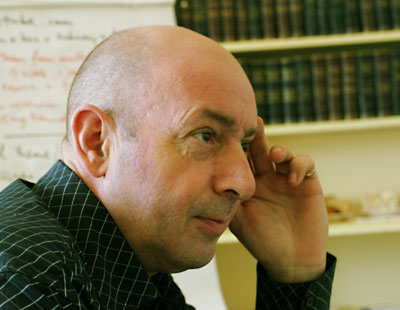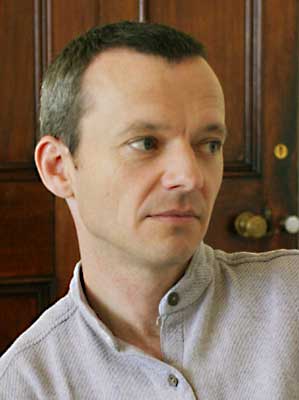
 |
jescom | meetings | documents | links | sjweb |
Communication and the British Province

Ged Clapson
The British Province increased its investment in communication this year by 100% when it brought Father Peter Scally to join layman Ged Clapson in developing the province's use of communications. The two don't directly work together since Clapham is a member of the province staff while Scally is in charge of new communication initiatives. Both work out of the Farm Street offices in London's Mayfair district.
Ged Clapson has served as the communication director for the British province for two years and brings an extensive journalism background to four areas: 1) "intra-province communication" - which means articulating the vision, affirming those already at work in existing ventures and promoting new ventures; 2) relationships with the Church, watching them in the press, using the press to improve them; 3) "ad extra" communication: moving beyond Church channels, using secular channels to promote the Society as a voice within the world (more of a P.R. kind of approach); and 4) raising Catholics' awareness of the media and teaching them how to make use of new digital media to spread the Gospel. Elements of this include media awareness, media empowerment and using media evangelistically.
The journalist works out of a small office just down the hall from the Socius but his supervisor is the development officer, Paul Hamil SJ, who is also vocations promoter. In this case development means planning and not fund raising. One of the province activities is "Jesuit Week" which started at Wimbleton and spread to Stonyhurst; Clapson provides information on Jesuit lives and work. He plans to rearrange the province's publications by turning Chaplain's Weekly into a publication for Jesuits only and starting a new publication for Jesuits and lay. He has recently begun sending out Chaplain's Weekly in Adobe PDF format.

Peter Scally SJ
Peter Scally SJ is just starting up a new office focused on new communication initiatives. He spent the last two years doing parish work in London and has just begun to set up his new office which perhaps symbolically is closer to the front door and to the public than Clapson's. Father Provincial David Smolira wants Scally to preserve a certain distance from regular province work so that he can develop new ways of using communications to reach out to people. His track record as co-developer with Fr. Alan McGuckian of Sacred Space augurs well for the success of this new job.
The young Jesuit's first initiative was to develop a new web site that offers audio meditations in MP3 format for people to listen to as they commute to and from work. visit the site and listen for yourself. The basic concept is a five-minute meditation that people would download into portable music devices and listen to on their way to or from work each day. The program would have places to pause and consider a suggestion before continuing to listen more. Scally is aware of the suggestive power of sound, as the early experience of radio proved. Sound effects can create a kind of "composition of place" at the start of a reading. There could be different voices between the narrator and the actors taking parts in the story. Scally plans to experiment with various formats to test for what is most effective: songs with words or just instrumental music? How culture-specific does the music have to be? (ie: would a Latino rhythm put off Anglo prayers, etc?).
This kind of prayer is almost like a guided meditation, with the narrator leading the listener step by step, and in effect teaching him or her how to pray.
Another initiative will create a site that assumes spiritual web surfers want a response from a web site, not just something to read. By interacting with some time of artificial intelligence and searching mode, visitors could tap into scripture readings that match their desires, somewhat like what happens with a real living director. First the user would input some data about himself, probably more than just a word for a keyword search. This might be like the movie search site where you pick some movies you like and the program suggested some others. Then the program would respond by suggesting a reading or more. The program would need to remember the interchange, both the initial input and the suggestions so that if the person comes back to the site, he is recognized and has the option of trying again with more data or of contacting someone from a bank of Jesuits and/or lay people who could then do an actual email exchange.
Scally's is also considering putting a version of the Spiritual Exercises on CD. There is no point in redoing what Creighton U. has already done with its online version of the Exercises in Everyday Life. Rather Scally wants to address young adults, either those finishing university studies or those who have finished but are not yet in a life-long career commitment. The premise is that many people in this age group ask themselves the question, "What am I going to do with my life?" and that the Spiritual Exercises are a good tool for answering that from a faith perspective. So this would be an adaptation of the Exercises from the point of view of the young person.
Given that perspective, the CD or DVD could be considered as a sort of extended preparation days aid, more than as the retreat itself. During the time a user is going through the CD/DVD, they would have the option for reading interviews with other young people whose experience establishes the context of the retreat. Some of the people would also have video interviews that they could watch. The hope is that stories about the experience of others would illuminate the experience of the user. There would also be some prayers and meditations and some things that they could do, but the CD does not attempt to replace the retreat. Rather it would prepare someone for a retreat and invite them to continue deeper with an actual director who could help them pray.
Even if the CD does not work out as he initially anticipates, the question he raises is very important: "How can we take the spiritual resources that we have and make them available to a group of people who need them, beyond the limits of the chaplaincies, parishes, etc. which are too few to meet the needs of he great numbers of young people?"
The Exercises represent a wisdom source refined over the centuries. Ignatius was a master of the human spirit before we became aware of gurus. So our tradition has much to offer people who feel the hollowness of living only for themselves and want to do something more with their lives and talents.